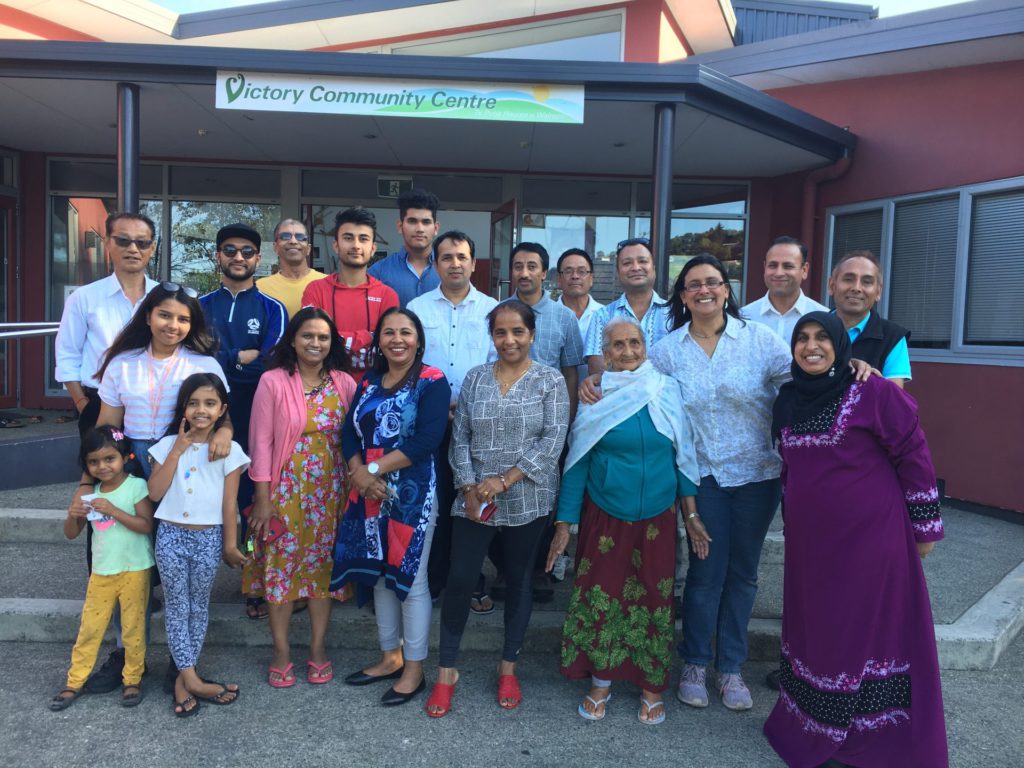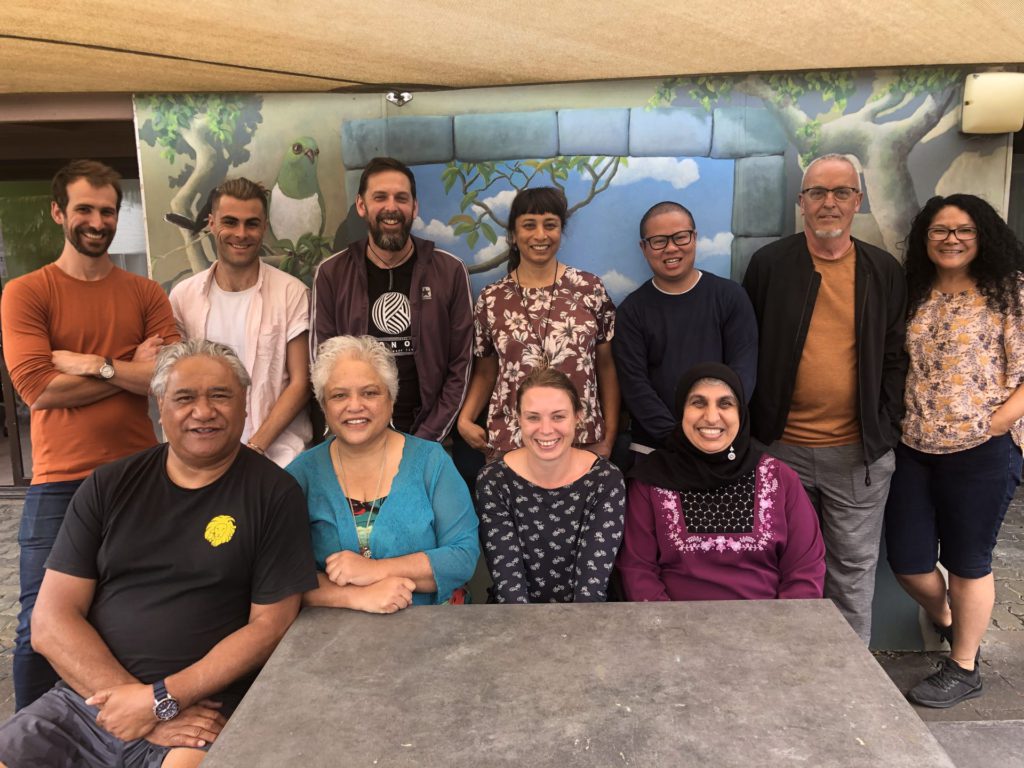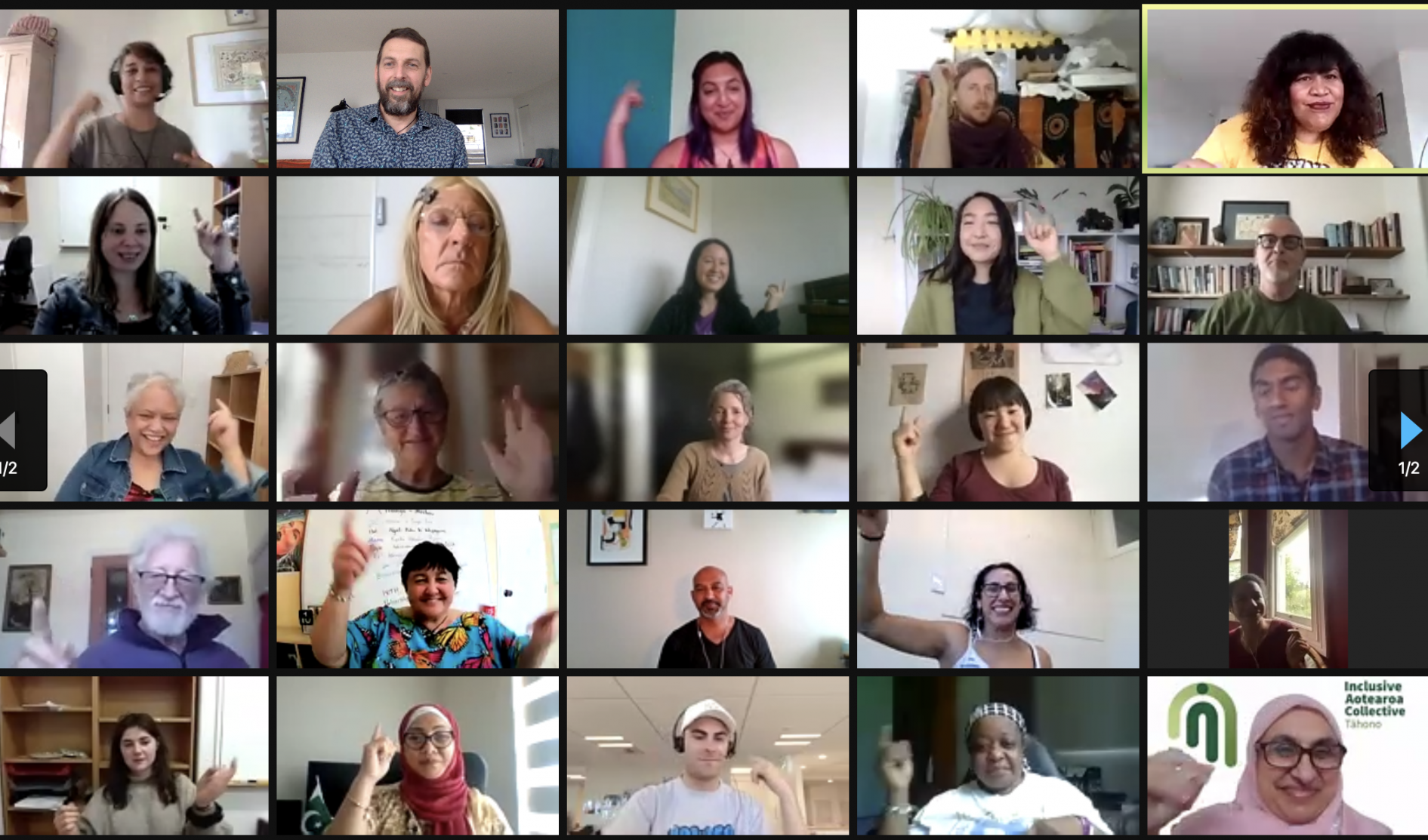Tāhono: He Wānanga Tuhonohono (Wayfinding for Belonging)
| Tāhono: ‘Hono’ means to link, to connect. There is an ancient healing amongst Waikato and Maniapoto called ‘hono’, for broken bones, to reconnect them! The prefix ‘ta’ has the English equivalent of ‘to cause’ so ‘Tāhono’ means ‘to cause to connect’, to bring together. Tāhono is also used in our name and the whakatauki gifted to us by Associate Professor Tom Roa (Ngāti Maniapoto, Waikato)
Tuhonohono: Tu – stand, honohono – binding or interlocking together |
Belonging is fulfilled by trust, friendship, social connections, the giving and receiving of love, compassion and kindness, and most importantly, acceptance. To experience a sense of belonging in society, you need the freedom to be your authentic self. Belonging means being fully accepted and included, just as you are, without fear of discrimination or exclusion.
2021 has been huge for Inclusive Aotearoa Collective Tāhono (IACT). To tell you where we are now, we first need to share where we came from…
Our beginnings…
The Inclusive Aotearoa Collective Tāhono project became a reality in April 2019, not long after the March 15 terror attack in Christchurch. It was developed around the powerful concepts of connection, kinship and belonging, with Anjum Rahman appointed as Project Lead.
Our project aims to use a cross-sector, collaborative approach to create a socially inclusive Aotearoa New Zealand – a nation founded on the partnership of Te Tiriti ō Waitangi, that provides a place for all. The end goal: a more coordinated approach across communities and groups working to create an inclusive society.
The 2020 Research Roadtrip

Belonging & Inclusion hui with the Bhutanese community in Nelson – February 2020
You can’t carry out a community-led project without first hearing from the community! So last year we travelled around the motu asking people to share their experiences of belonging and not belonging, focused around these three questions:
- When do you feel like you belong?
- What stops you from feeling like you belong?
- What needs to change so you feel like you belong
Conversations were held at 46 locations across 17 regions with 860 people, and the results of this research (15,000+ pieces of qualitative data!) are available to read on our website.
Accompanying this research project is also an in-depth Literature Review funded by Capturing the Diversity Dividend NZ (CaDDANZ), University of Waikato, which explores all the research to date that has been carried out on the topic of belonging and inclusion in Aotearoa New Zealand.
Choosing a Social Change Model

Image Credit: Collaborative artwork by Elia Pellegrini, Dino Tomic, Jonas Jödicke, Jonna Lamminaho, Vince Okerman, Pavneet Sembhi
With our research in hand coupled with our desire to take a collaborative, cross-sector approach, it was time to select a social change model to guide us. We chose to use the Constellation Model, which has been shown to be highly effective in supporting social movements and social change.
We like it so much, we’ve made it the central feature of our belonging and inclusion strategy! The Constellation Model makes sense for our mahi because:
- Constellation collaborations provide a focus on manaakitanga, kotahitanga and wāhitanga and so are uniquely suited to Aotearoa New Zealand
- They support joined up effort and avoid duplication of effort
- They are action-focused and flexible
- They can respond to the diverse needs of multiple communities
- And most importantly, they allow individuals & organisations to preserve their identity while simultaneously working together on a shared goal.
So, we’ve got the model and the research, what next?
Growing the kaupapa
At the beginning of 2021, a group of facilitators joined the IACT team to facilitate regional hui and deepen the dialogues that were revealed in our research. These regional hui have been essential in helping us join up conversations within and across regions, and encouraging people and organisations to define the issues that are important to their communities.

Back row from L-R: Tim Foote, Atarau Hamilton-Fuller, Tim Pare, Ara Alam-Simmons, Aram Wu, Graeme Storer, Talie Schmidt-Geen
Front row L-R: Adrian Te Patu, Keriana Tawhiwhirangi, Anna Burgin, Anjum Rahman
Also in 2021 we:
- Launched an updated website with the results of our belonging conversations, incorporating Te Reo Māori, English and Sign Language
- Continued to develop our relationship with Pou Tikanga, National Iwi Chairs Forum (NCIF), and worked together as a team to embed that partnership and Te Tiriti in our ways of working by developing a new Kawa Tikanga policy.
- Became a co-led Collective, with Anjum Rahman and Keriana Tawhiwhirangi sharing the lead.
- Added a Communications Coordinator to our team to help amplify our kaupapa across the motu and grow our social movement.
- Shared our expertise in a consultative capacity with key Government departments to aid them in developing social cohesion and anti-racism plans.
- Developed a solid Monitoring & Evaluation framework to help us assess and measure the impact that our mahi is having.
- Became an allied organisation of the MindtheGap.nz initiative.
- Became an Associate Member of The Refugee Alliance.
- Launched a new webinar series called Community Voices that puts the views and whakaaro of community members at the centre of the conversations.
- Continued to expand our community networks and connected with numerous new organisations and groups who are working in the same space.
Time for a national wānanga
All of this activity led up to our main event for 2021 – our 2-day virtual Tāhono: He Wānanga Tuhonohono – Wayfinding for Belonging, which took place on Friday 26 and Saturday 27 November. We originally planned to host this important mahi in person in Te Whanganui-a-Tara, but due to the uncertainty of Alert Levels, we decided to move the wānanga online.

Some of the participants at our Wayfinding for Belonging online wānanga enjoying some virtual icebreakers!
The Tāhono virtual wānanga brought together individuals and organisations from across the motu, who have joined us on our social change journey over the last two and half years. Together we navigated the journey ahead using the unique wayfinding method.
Navigating the journey ahead using Wayfinding
“In Samoa, there is a saying: “You cannot change the way the wind is blowing, but you can change the way your canoe is facing.” (Flying Geese Productions)
Creating these Constellations is big work, so we engaged Faumuina Felolini Tafunai of Te Toki Voyaging Trust and Flying Geese Productions to lead our wānanga.
Faumuina led us through a Wayfinding process to guide us in the formation of our Constellations. Wayfinding comes from a genealogy of knowledge passed down through Pacific star navigators and ocean voyagers. Based on many guiding conversations with navigator Hoturoa Barclay-Kerr and by voyaging aboard Haunui waka, Faumuina has created an incredibly dynamic wayfinding model to help groups like ours to navigate uncharted territory and plan for the journey ahead.

The Wayfinding method developed by Faumuina Felolini Tafunai
Wayfinding is an extremely powerful approach to creating innovative solutions in an uncertain, complex and constantly changing world. It also rests on the problem-solving skills needed to successfully navigate from place to place, taking into account all the different elements of the journey – Te Waka, Island of Success, Values Compass, Te Moana, Whenua etc…
During the wānanga the participants:
- Identified ways in which they can make a difference through working together to support belonging and inclusion
- Recognised opportunities to collaborate
- Started the formulation of action plans for 2022
Even though the event was held online, there was plenty of drive and energy among the participants to contribute ideas and form new relationships. Two new Constellations were formed, and a third sub-Constellation is emerging.
“We know that the best way to counter division and discord is to bring communities together to work on issues that are of interest to us all. Whether this is by improving the way our stories are told or how we bring Te Tiriti into our systems, positive change requires commitment and coordination of our efforts.” – Anjum Rahman, Project co-Lead
IACT in 2022
Looking ahead to 2022, IACT will continue to support the development of these new Constellations as they start to take shape. Our ultimate goal is to support a coordinated approach across communities and groups who are currently working in this space – we can create greater positive impact by working together. We’ll post regular updates here on our website showcasing the progress of these new collaborative groups, and how you can support their mahi as the year unfolds.
A special ngā mihi nui to our funders for supporting and enabling our mahi over the last two and a half years; Foundation North, Todd Foundation, Trust Waikato, Eastern & Central Community Trust, New Zealand National Commission for UNESCO, Wellington Community Trust, CaDDANZ, Momentum Waikato, Tindall Foundation, InternetNZ and other generous donors.
We look forward to continuing courageous and healthy conversations, as we imagine and help create a fully inclusive Aotearoa New Zealand.
|
He aha te kai a te rangatira? He kōrero, he kōrero, he kōrero. What is the food of the leader? It is knowledge. It is communication. Aroha atu, aroha mai Let us show respect for each other Tātou i a tātou katoa For one another Hui e! Taiki e! Bind us all together! |